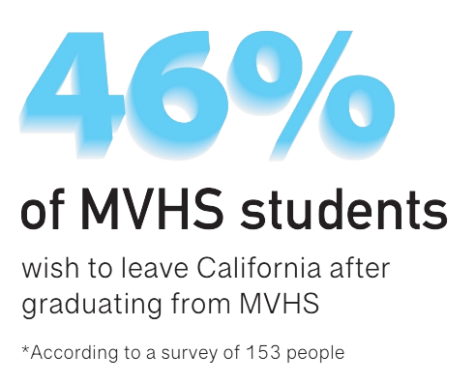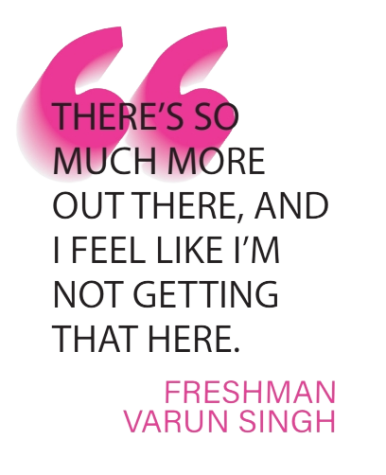Leaving CA
Exploring why some students want to leave the state they call home
According to the New York Times, the top destinations for Californians leaving were Texas, Arizona, Nevada, Washington and Oregon.
December 21, 2022
Lifelong California resident and junior Anika Karandikar remembers seeing California as the “best state on the planet” as a child. Now, witnessing inequality and a competitive culture in the area, Karandikar has gained a desire to leave, feeling “tired of the environment” she has grown up in.
In a phenomenon deemed the California exodus, 7.5 million people have moved from California to other states, leading to the slowest rates of growth ever recorded in the state, according to the Public Policy Institute of California. This trend reflects the feelings of many students at MVHS with 46% of students saying that they wish to move out of the state after graduation.
Along with Karandikar, freshman Varun Singh says his experiences learning about history and mythology, especially in school, have expanded his desire to encounter new experiences outside of the state. “My family [immigrated] from India, and I [have] learned a lot of interesting stuff about India [in school],” Singh said. “There’s [also] Rome and Greece and the Mediterranean [which] has a lot of interesting history around it. The mythology around the Mediterranean — you could learn about that for days. I want to explore that. It’s encouraged me to branch out.”

Along with personal reasons, living in the state itself also poses challenges for many residents with the competitive culture, especially in the Bay Area. Sophomore Anushka Kumaran cites stress, such as at MVHS, and high taxes being the biggest problems of California living. Karandikar also says the high cost of living is an issue for her moving forward.
“If I am fresh out of college and I attempt to make a living here, it’s going to be very difficult given the housing prices and the rent,” Karandikar said. “The state is really expensive.”
While students like Karandikar and Singh wish to leave California, some students want to stay, feeling attached to the place where they have grown up. Kumaran acknowledges that California is often called a “bubble,” but believes that the state offers opportunities for connection through diversity.
“There’s so many people from different backgrounds and different cultures,” Kumaran said. “That’s been really cool — being able to connect with my culture and do things with people in my community. People call this area a little bubble, and maybe that’s why I’m kind of scared to leave it.”
Freshman Arielle Fam agrees that diversity in California has helped her connect with others. Fam also describes herself as a “foodie” and says that the diversity in not just people but also cuisines has been one of her favorite things about the state. Besides cultural diversity, Singh describes California as also having a diverse range of attractions like the Monterey Bay Aquarium. Kumaran agrees with this sentiment and says that national parks are some of her favorite places in the state.
“Thinking about the state as a whole with nice national parks — we have Yosemite, we have Sequoia National Park,” Kumaran said. “Those are nice. I haven’t even been to [northern] parts or the super southern parts. So the state is so big that I haven’t even seen some parts yet, and I think those parts will definitely be very different too.”
Additionally, Karandikar says that the tolerance of Californians compared to other places like the Midwest is something that she will miss if she leaves.
“A lot of issues like LGBTQ rights [are] really tolerant in California,” Karandikar said. “A lot of other states don’t have the sort of protection on abortion and all the stuff that California does have.”

As students look beyond graduation, the academic and job opportunities available in the state are also a concern. California is known for prestigious universities and massive companies, and despite tech layoffs of more than 45,000 workers in the Bay Area this year, Kumaran believes that California still has STEM opportunities that she wants to pursue. For Singh, however, these STEM opportunities are not as appealing, as he wishes to pursue something in writing or history.
“There’s not that many opportunities in those types of fields,” Singh said. “Everything’s more STEM-based. It’s like once people keep telling you, ‘Tech this, tech that’ — you kind of have enough at some point. I know it’s an important part of the world, but there’s so much more out there, and I feel like I’m not getting that here.”
As Fam reflects on her future, she believes that she will pursue something like computer science and that she will stay in the state beyond college. She believes that California is the environment that she is most comfortable in and that even if she enjoys traveling to other places, California is “just better for living.”
“I’ll be trying to get into a university here in California, and then find a job here,” Fam said. “Whether it’s in this specific area or not might change, but I think generally, I’ll probably stay. Think about what you want for yourself and your future and weigh your odds. How would staying in California affect that?”

















